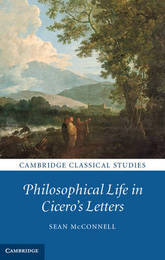
|
Philosophical Life in Cicero's Letters
Hardback
Main Details
Description
Cicero's letters are saturated with learned philosophical allusions and arguments. This innovative study shows just how fundamental these are for understanding Cicero's philosophical activities and for explaining the enduring interest of his ethical and political thought. Dr McConnell draws particular attention to Cicero's treatment of Plato's Seventh Letter and his views on the relationship between philosophy and politics. He also illustrates the various ways in which Cicero finds philosophy an appealing and effective mode of self-presentation and a congenial, pointed medium for talking to his peers about ethical and political concerns. The book offers a range of fresh insights into the impressive scope and sophistication of Cicero's epistolary and philosophical practice and the vibrancy of the philosophical environment of the first century BC. A new picture emerges of Cicero the philosopher and philosophy's place in Roman political culture.
Author Biography
Sean McConnell is Lecturer in Classics at the University of Otago.
Reviews'The author has done a great service in pushing far beyond the conclusions, now well-established, that Cicero could 'do' philosophy or fit it to a Roman audience. What the letters reveal - even more than the treatises, perhaps - was that Cicero was not merely putting favored doctrines into practice, but experimenting constantly with how ideas and political realities could reshape one another. A truly gifted intertextualist, McConnell shines brightest in his attention to the manifold ways in which Cicero engages his intellectual forebears.' Lex Paulson, Bryn Mawr Classical Review
|